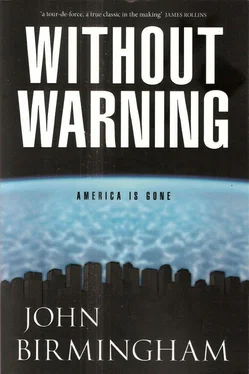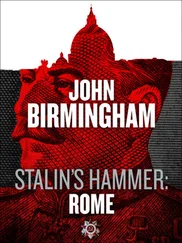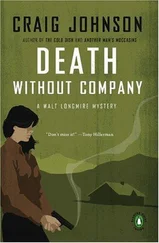John Birmingham - Without warning
Здесь есть возможность читать онлайн «John Birmingham - Without warning» весь текст электронной книги совершенно бесплатно (целиком полную версию без сокращений). В некоторых случаях можно слушать аудио, скачать через торрент в формате fb2 и присутствует краткое содержание. Жанр: Триллер, на английском языке. Описание произведения, (предисловие) а так же отзывы посетителей доступны на портале библиотеки ЛибКат.
- Название:Without warning
- Автор:
- Жанр:
- Год:неизвестен
- ISBN:нет данных
- Рейтинг книги:4 / 5. Голосов: 1
-
Избранное:Добавить в избранное
- Отзывы:
-
Ваша оценка:
- 80
- 1
- 2
- 3
- 4
- 5
Without warning: краткое содержание, описание и аннотация
Предлагаем к чтению аннотацию, описание, краткое содержание или предисловие (зависит от того, что написал сам автор книги «Without warning»). Если вы не нашли необходимую информацию о книге — напишите в комментариях, мы постараемся отыскать её.
Without warning — читать онлайн бесплатно полную книгу (весь текст) целиком
Ниже представлен текст книги, разбитый по страницам. Система сохранения места последней прочитанной страницы, позволяет с удобством читать онлайн бесплатно книгу «Without warning», без необходимости каждый раз заново искать на чём Вы остановились. Поставьте закладку, и сможете в любой момент перейти на страницу, на которой закончили чтение.
Интервал:
Закладка:
Colonel Maccomb coughed uncomfortably, and sipped from a glass of water by the podium before answering. ‘General, the best information I have is that the special appropriations bill will pass with the help of the Conservatives. There are a hundred and thirty-four members of Blair’s Labour Government who have publicly confirmed they will vote against it, but the Conservative Party leader has pledged his support so it will go through.’
‘And this little ethnic cleansing program of theirs, what’s your reading of that?’ Franks probed further. ‘Is it likely to bring down the government? And if so, can we expect the same level of support from the British in future?’
Ritchie thought Maccomb looked even more uncomfortable at being asked to read the storm clouds of British politics, but it was a fair question. For the moment, at least, most of the day-today cost of running the US military was being met by alliance partners such as Britain and Japan. NATO was split on the issue, with countries like Poland stumping up support in cash and kind, while others, like France, were so busy falling apart they were worse than useless, as Ritchie knew all too well.
‘The policy is supported by a clear majority of the British electorate,’ said Maccomb. ‘But the significant minority who oppose it can be expected to do so by all the means at their disposal. There will be bloodshed, yes. From our point of view, however, both the government and the opposition are committed to the supplementary appropriations process. So any change in government will not affect that. However, whether the UK can actually afford to maintain such outlays, even in the short term, is another matter entirely. And not one I am really qualified to discuss.’
Franks smiled grimly. ‘Nice buck pass, Colonel. Damn, I never thought I’d see out my days as a gun for hire. Okay. We’ll put that on the back burner. Continue.’
The intelligence officer returned to his notes and brought up a slide show of images culled from European news media.
‘Fighting in France has intensified over the last two weeks. Elements of the state are in open conflict with each other, while large-scale street clashes that began as food and race riots have developed into open, disorganised tribal warfare – largely based on ethnic lines, but exacerbated by the involvement of some criminal syndicates in Marseilles and Lyons, and by the arrival of outside agitators from throughout the EU. Most official border crossing points have been closed, but that means nothing. France’s borders aren’t simply porous. They largely do not exist, and haven’t for years. Additionally, we have very strong indications of government-level assistance for some of this cross-border movement, especially of skinhead gangs from the eastern regions of Germany into the main metropolitan areas of France. The numbers involved are not trivial, either. We tracked three train-loads of neo-Nazis from Berlin and Dresden all the way to Paris. In total, they numbered more than four thousand strong.’
‘Good Lord,’ muttered Ritchie. ‘You mentioned these were government-sanctioned movements. Which government?’
Maccomb pressed his lips together as though chewing over something unpleasant. ‘It is inaccurate to speak of a unitary state authority in France right now,’ he began, carefully. ‘But one bureau of their Direction centrale des renseignements generaux, the General Information Service, has been in close and constant contact with the BND, the German Government’s foreign intelligence service, and the Russian FSB, which maintains extensive networks in the former East German provinces. It’s significant because the GIS, as we call it, is the intelligence arm of the French police, which answers directly to the Interior Minister, Mr Nicolas Sarkozy. And, of course, his Emergency Committee has assumed, or some would say usurped, responsibility for state security from the Elysйe Palace since President Chirac was wounded in the suicide bombing of March 25.’
Ritchie, who had privileged access to information about the situation in France that nobody in the room other than Franks enjoyed, still found Maccomb’s explanation difficult to follow. ‘I don’t see how this all hangs together, Colonel,’ he objected. ‘What is your point?’
Maccomb shrugged before bringing up video footage copied from a French news service. Up on the wall-mounted screen, a hugely violent confrontation was playing out between thousands of rioters in Clichy-sous-Bois, a poor commune in the east of Paris. Hundreds of black-clad French riot police stood by as a wave of shaven-headed thugs appeared from a maze of side streets in a coordinated assault on a mass of dark-skinned rioters. Armed with clubs and even-edged weapons, they cut a swathe through their densely packed, inferior-armed opponents.
‘The death toll from that one encounter was over two hundred,’ said Maccomb. ‘It didn’t rate as a news story for more than a day, because there were bigger and more violent riots elsewhere in the city, and then the following day the first of the radioactive plumes from reactor meltdowns in CONUS crossed the French coast. The CRS – the French riot police – not only did not intervene, but they actually facilitated the attack and later the safe withdrawal of the neo-Nazi street fighters.’
The colonel then brought up footage of two police officers calmly chatting with a small number of fascist organisers, apparently giving them directions, while a murderous brawl took place a stone’s throw away. The skinheads appeared to take a good deal of advice from the officers before running off to marshal their own forces.
‘At no point in any of the clashes of the past weeks have the CRS decisively intervened to stop any major incidents of violence, except on those occasions where ultranationalist forces looked to be in trouble. I have a separate briefing note on this subject, and will cover it at length in due course, but for now I think it is reasonable to categorise the situation in France as a race war within the general population, and a civil war between some elements of the state security apparatus.’
Franks and Ritchie exchanged a quick, wordless glance. They had their own angle on the French troubles but it was not something they could discuss, even in this forum.
‘Thank you, Colonel,’ said Franks. ‘It’s fascinating, even a little satisfying, but we need to move on. You have a quick run-down on the Russian situation?’
Maccomb nodded. ‘Russian military forces either remain at the highest level of alert or, in cases such as Georgia and Chechnya, have been deployed on active duty. None of the deployments raise any threat to American forces or interests, however, and the Russian Defence Ministry has been assiduous in keeping us informed of any developments that might impact upon our interests. They are treading very carefully around us, and trying hard not to generate too much friction along the Chinese border…’ He glanced up at Ritchie before continuing. ‘Which brings us to the Pacific Command.’
There was a noticeable shifting of postures around the table. PACOM was home. At least half of the officers in the conference belonged to Admiral Ritchie’s theatre command.
‘There are two serious flashpoints within PACOM,’ Maccomb went on. ‘I would have said three until recently, but the Korean peninsula is one of the few areas where tensions seems to have decreased in the last month, most likely due to the volume of aid shipments heading north from Seoul. For now, the bribes are working. For now, as well, there have been no calls from the north for the withdrawal of US forces. However, there will be an emergency session of the National Assembly in two days, to discuss an urgency motion requiring the withdrawal of all foreign forces from the Republic’
Читать дальшеИнтервал:
Закладка:
Похожие книги на «Without warning»
Представляем Вашему вниманию похожие книги на «Without warning» списком для выбора. Мы отобрали схожую по названию и смыслу литературу в надежде предоставить читателям больше вариантов отыскать новые, интересные, ещё непрочитанные произведения.
Обсуждение, отзывы о книге «Without warning» и просто собственные мнения читателей. Оставьте ваши комментарии, напишите, что Вы думаете о произведении, его смысле или главных героях. Укажите что конкретно понравилось, а что нет, и почему Вы так считаете.












